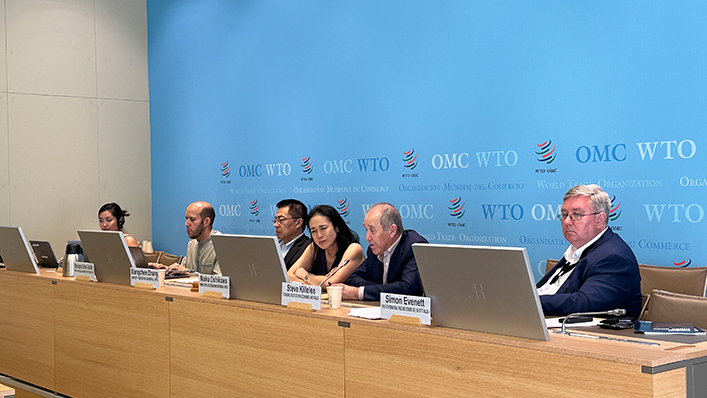
“Trade for Peace has been a part of the WTO’s transformation journey under the leadership of Director-General Ngozi Okonjo-Iweala to make the multilateral trading system work for the people, including those in states classified as fragile and conflict-affected,” said WTO Deputy Director-General Zhang Xiangchen in his opening remarks. “To deliver this vision, collaboration and partnership have been at the heart of the Trade for Peace Programme”, he added, commending the work of the IEP as one of the partners of the Programme’s research pillar.
In reference to the 2023 Global Peace Index (GPI), DDG Zhang noted: “The global economic impact of violence is enormous — US$ 17.5 trillion or 12.9% of global GDP — and this impact is particularly concentrated in the countries most affected by violence.”
“The key question is how can trade be a positive force, creating economic opportunities and employment and building mutually beneficial relationships between people and communities which trade with each other, rather than a negative force which may perpetuate the vicious cycle of conflict and violence over the control of commodities and other natural resources,” he added.
Steve Killelea, IEP founder, presented the key 2023 GPI findings on peace and conflict trends, and the cost of violence. “By reducing global violence by 10%, US$ 1.75 trillion could be added to the global economy — an amount equivalent to the economies of Ireland, Denmark and Switzerland put together,” he said.
The economic cost of violence demonstrates that investing in peace is a worthwhile investment, especially in the face of the rising number and intensity of conflicts, noted Mr Killelea. He also stressed that, given the nature of modern wars and weaponry, conflicts are practically unwinnable, which highlights the need to seek alternative solutions to peacebuilding, especially harnessing trade
Dr Simon Evenett, Professor of International Trade and Economic Development at the University of St. Gallen (Switzerland), explained why monitoring conflict and violence is essential for trade policy analysts: “Anything that alters production or consumption decisions affects cross-border commerce and should be of interest to us,” he said.
Trade policy analysts should pay particular attention to conflict and fragility given how much they can affect trade. The links between trade and peace are dynamic and therefore complex, but there is space for win-win policies that simultaneously deter violence and create commercial opportunities, added Dr Evenett.
Mr Mustapha Sadni Jallab, Chief of the Knowledge Management Section of the Division for Knowledge and Information Management, Academic Outreach and the WTO Chairs Programme, provided an update on the forthcoming Trade for Peace publication, which will be published in 2024. He stressed that trade, poverty and peace remain intricately connected: “Trade is not an end in itself; it is a means, a tool, to support economic development,” he said.
An open-ended discussion, moderated by Maika Oshikawa, Director of the WTO Accessions Division, delved into conflict trends, perceptions in the media, and the role of different communities around the world in addressing conflict and violence, particularly the trade community and the WTO. Panellists agreed that while the relationship between trade and peace is at the root of the multilateral system, it may be more relevant today than ever.
Recording of the event here.
Share
Reach us to explore global export and import deals